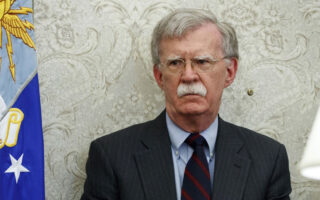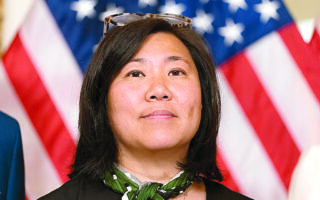If Ukraine falls, Russia will ‘directly menace the European NATO members’
Ahead of appearing at the Delphi Economic Forum, the Harvard University historian talks to Kathimerini about US foreign policy and the crises on Europe’s doorstep

He may study the past but does not hesitate to comment on the present or make predictions about the future. Scottish historian Niall Ferguson, author of “Doom: The Politics of Catastrophe,” among many others, is clear about one thing: if the United States does not restore support to Kyiv, Ukraine will no longer be able to hold the line and Russia will become a direct threat to NATO’s European members.
Milbank Family Senior Fellow at the Hoover Institution and a senior fellow at the Belfer Center for Science and International Affairs at Harvard University, Ferguson also believes that Europe’s “strategic autonomy” is still a long way away.
Speaking to Kathimerini ahead of his arrival in Greece for the Delphi Economic Forum, taking place on April 10-13, Ferguson expects Joe Biden to be re-elected in November, but in the event that he is not, Donald Trump will not follow through with threats to withdraw the United States from NATO. It is a “negotiating tactic,” he argues, to compel the alliance’s European members to spend more on defense.
‘I am not sure there is any appetite in France or any other European country for direct involvement in the war in Ukraine’
As far as the Middle East is concerned, Ferguson is not optimistic, and when it comes to the Greek military dictatorship of 1967-1974 and the Turkish invasion on Cyprus in 1974, he prefers to withhold comment until he’s finished the second volume of his biography on former US secretary of state Henry Kissinger.
You have been skeptical of US foreign policy in recent years. Where does your concern stem from? Do you think, for example, that the Biden Administration could have prevented Russia’s invasion of Ukraine?
They could certainly have done much more to deter Putin from launching his invasion force across the border. In 2021 they reduced arms supplies to Kyiv, removed the Nord Stream 2 sanctions and signaled that Russia would face only sanctions if it invaded. I said at the time that this was folly and I was right.
What do you think the next act of the play will be if Ukraine falls into Russian President Vladimir Putin’s hands?
Well, first let me say that this does not need to happen. If the EU, the US, the UK and Japan – to name the most important supporters of Ukraine – sustain and indeed increase their military and economic support, Ukraine can hold the line. It is already winning the war in the Black Sea. But if the US does not restore support, then at some point next year Ukraine will struggle to hold the line. That would be a disaster not only for Ukraine but for the West. Russia would directly menace the European NATO members.
Do you think Joe Biden will lose the upcoming election? And if Donald Trump is elected, do you think there is a risk of the US crucially undermining NATO? Or will the checks and balances in the US system of government have the final say?
I think Biden will probably win by a narrow margin. But if Trump wins, despite his legal problems and his relative lack of campaign funding, then I am not sure it’s clear that NATO is undermined. That did not happen in his first term. Nor did relations with Russia improve. Trump threatens Europe with withdrawal to force the European members of NATO to spend more on their own defense. It seems to work as a negotiating tactic.
You have studied Henry Kissinger in depth and have discussed geopolitics and history with him – in fact, you are preparing the second volume of his biography. Do you have anything to share with us regarding his role in shaping Greek history? I am referring, of course, to the period of the junta and the Turkish invasion of Cyprus.
I would prefer to wait until my book is finished before discussing this complex matter!
French President Emmanuel Macron has said that he does not rule out the possibility of seeing European soldiers in Ukraine at some point. How do you interpret this statement? More broadly, do you consider the EU – politically and operationally – capable of acquiring a measurable military capability?
I am not sure there is any appetite in France or any other European country for direct involvement in the war in Ukraine. I am not quite sure why he said that, as it was bound to elicit objections from Germany and other countries. I suspect it is part of his domestic-political strategy of demonizing the radical right for being pro-Putin. As for the EU’s military capability, it currently has pitifully little, despite Mr Macron’s dream of “strategic autonomy.” It would take at least 10 years to rectify that.
Do you see light in the tunnel of the Middle East crisis? What is the best feasible scenario based on the data so far?
There’s no light in sight. As soon as Hamas has been destroyed, Israel must turn its intention to the threat posed by Hezbollah along the border with Lebanon. If the Israelis decide to attack Hezbollah preemptively, it will be a much harder war than the one in Gaza. The only “feasible scenario” is for Israel to make clear to Iran that it will not tolerate threats from Iranian proxies. But then the question becomes: How can Israel prevent Iran from acquiring nuclear weapons if relations between Jerusalem and Washington have completely broken down, which they are close to doing?





